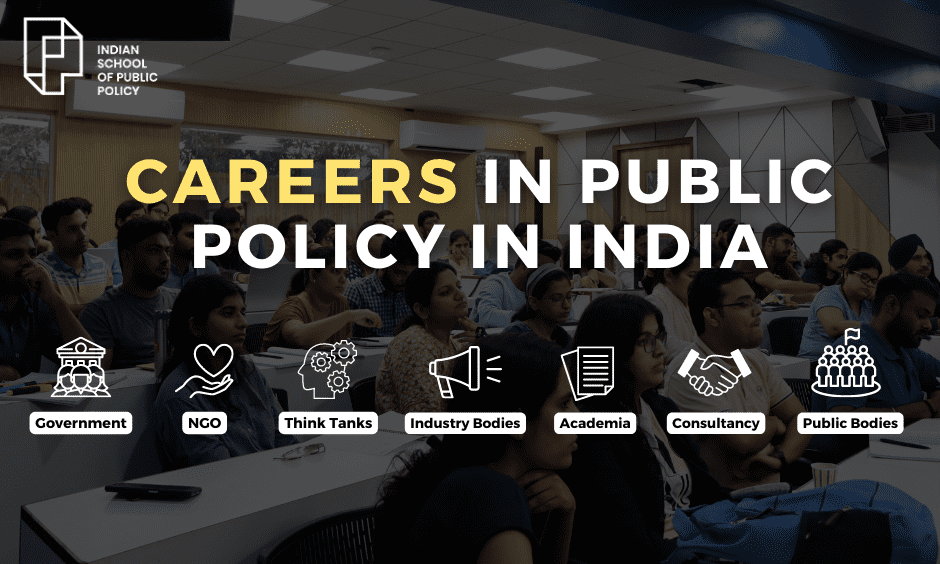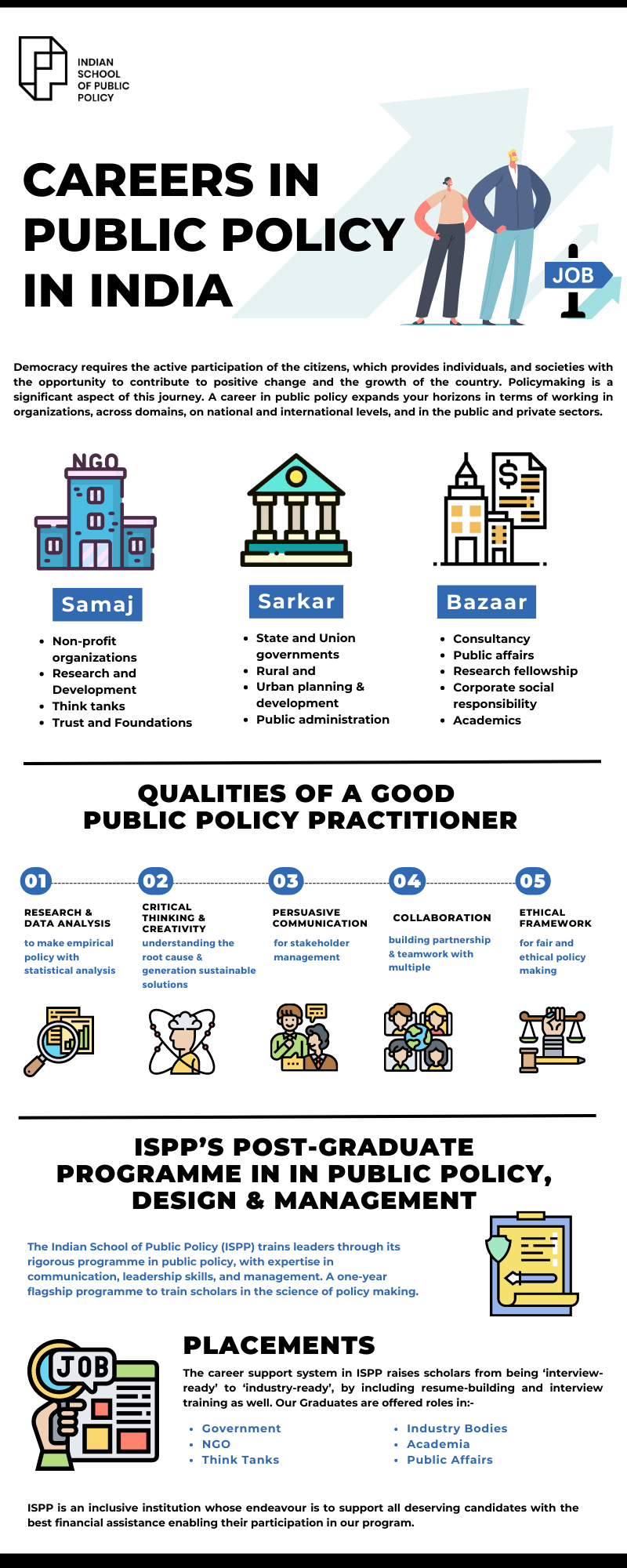
Careers In Public Policy In India

Democracy requires the active participation of the citizens, which provides individuals, and societies the opportunity to contribute to positive change and growth of the country. Policymaking is a significant aspect of this journey.
In terms of career too, right now is an exciting time to become a public policy professional in India. A career in public policy expands your horizons in terms of working in organisations, across domains, on national and international levels, and in public and private sectors. Having said this, it is also crucial to acknowledge the interest and passion amongst today’s youth, to create a sustainable and effective policy. This calls for future decision-makers to be equipped with an in-depth understanding of public policy. Governments, at the same time, are becoming increasingly open to the idea of recruiting fresh talent, ideas and designs from outside the bureaucratic ranks.
The public policy domain in India has grown over the past few years. It used to be a course mid-career bureaucrats pursued. The scenario, however, has changed, as today, the Indian government has been hiring individuals from outside the civil services to carry forward India’s governance through the challenges of the 21st century.
The public policy domain in India has grown over the past few years. A career in public policy expands your horizons in terms of working in organisations, across domains, on national and international levels, and in public and private sectors.
Register your Interest to Study at ISPP
Careers in Public Policy & Its Scope
The knowledge of public policy helps to comprehend the challenges faced by the country, modify earlier policies, and introduce new policies and programmes. It also equips the learner with the knowledge to analyse and understand new emerging issues affecting citizens, their environment, the economy, and other national and international issues to name a few.
Specialised courses in Public Policy were introduced late in countries like India. With an educational background in this field, one is confident to enter any and every sector in government, private organisations, and other domains where the prime focus of the government is to get innovative ideas and to make them useful for the development of the country and its people.
Education in Public Policy opens up multiple options for scholars in areas such as – careers in think tanks and independent research centres, teaching, research and development, and non-governmental organisations. The scope of public policy includes, but is not limited to the above as it is ever-expanding.
In The Government Sector
Environment, Social Sciences, International Relations, Political Science, Administration, Law, Management, Geography, Economics, Science, Maths, and Statistics are several activities that require knowledge of Public Policy. There are many opportunities in the state and central governments that are involved in rural and urban planning and require public policy professionals in the above areas.
Research and Development
Numerous organisations – both national and international are involved in research and development activities, hence, advanced research in public policy is a viable option for making a successful career in public policy. Today, several institutes are offering advanced courses and research activities and, of course, promising careers.
Teaching
Public Policy is one of the most prestigious courses in the Indian varsities. Universities and institutes educate and train students, and some even provide them with placements. Students who are enthusiastic about teaching can get appointed as lecturers and professors in various public and private universities.
Public Administration And Public Policy
Public administrators have in-depth knowledge of both – society and policies. They understand political pressures, as well as the pressures of civil society, media, political parties, and other groups. With an educational background in public policy, public administrators are able to successfully execute their duties in a more precise and ethical manner towards the government and the people.
Management And Public Policy
Pursuing a course in Public Policy gives programme and operations managers an idea of how to manage and cope with the financial and HR policies in their organisations. It also helps them to design effective public policy strategies. Sound training in public policy also equips employees with soft skills such as techniques on time management, handling multiple projects and building resilience during stressful times.
Specialised courses in Public Policy were introduced late in countries like India. Having an educational background in this field helps to comprehend the challenges faced by the country, modify the existing policies, and introduce new policies and programmes.
Essential Qualities
Below listed are crucial skills a good public policy professional must be equipped with
Research And Data Analysis – Public policy professionals must be well-versed in carrying out in-depth research and must stay abreast of all political developments at the national and international level, public opinions, and relevant current affairs. Their comprehension of methodologies and research tools is crucial as they are required to study data and diverging perspectives from research papers, reports, and surveys. They should be capable of analysing and integrating large volumes of qualitative and quantitative data. This helps them to have an objective sense of the facts, and develop an evidence-based understanding of the issue at hand, from all angles.
Critical Thinking And Creativity – Creativity is crucial for innovative solutions and must be balanced with critical thinking skills. The creative intellect enables policy analysts to comprehend the issues and predict the needs that might arise from each approach envisioned and identified as the fairest and the most effective solution.
Persuasive Communication – Communication is key for policymakers as it helps them to present their ideas to the government authorities and stakeholders in a persuasive way. This includes both verbal and writing skills, and the ability to respond to feedback, questions, and even criticism in productive ways. Only a path-breaking public policy practitioner will be able to break down important messages/ ideas and deliver their salient features with precision and clarity.
Collaboration – Public policy professionals must be able to collaborate with elected officials, specialists, colleagues, and most importantly the public while developing policy proposals. This requires patience, open-mindedness, and strong interpersonal skills. Great policy advising can never happen from sitting comfortably behind a desk. These analysts must develop on-ground connections, go through the correct channels, and present a compelling case for their ideas and perspectives.
Ethical Framework – Government should adopt ethical frameworks in its policy-making after giving due deliberation and consideration. Universal values like integrity, honesty, and credibility are uncompromising. Credibility requires Public Policy professionals to establish a reputation of being well-versed with the policy issues, being honest and reliable in providing both information and opinion to policymakers and also being consistent throughout. Integrity suggests the professional adheres to the value systems, codes of conduct, and legislations that regulate the conduct of public policy. This ethical principle reinvigorates and maintains long-term relationships.
Ethical framework, collaborations, communication skills, research and data analysis, and critical thinking and creativity – are key skills for a public policy practitioner to gain success.
Register your Interest to Study at ISPP
Courses In Public Policy in India
There are a number of courses for public policy at top universities and institutes in India –
- M.A. in Public Policy
- Post Graduate Programme in Public Policy
- Master in Public Policy
- Ph.D. in Public Policy
But one course that outshines all others is the Post Graduate Program in Public Policy offered by the Indian School of Public Policy.
There are a number of courses for public policy at top universities and institutes in India, but the one that outshines all others is the Post Graduate Program in Public Policy offered by the Indian School of Public Policy.
What Is ISPP?
The Indian School of Public Policy trains leaders through their rigorous programme in public policy, with expertise in communication, leadership skills, and management. The career support system in ISPP raises scholars from being ‘interview-ready’ to ‘industry-ready’, by including resume-building and interview training as well.
ISPP’s placement team propel scholars to widen their horizons, encourages them to explore various career paths and their areas of interest.
The Indian School of Public Policy trains leaders through their rigorous programme in public policy, with expertise in communication, leadership skills, and management.
What Is ISPP’s Post-Graduate Program In Public Policy?
Post Graduate Programme in Public Policy, Management, and Design is –
- ISPP’s flagship programme is for candidates that are interested in making an impact.
- The one-year programme trains students in the science of policymaking through a rigorous programme divided into 7 terms.
Placements
Public Policy graduates work either for the government or for private and non-profit entities. Graduates are offered roles of public policy manager, Research Analyst, Duty Manager, Welfare Officer and similar others. The average salary of a Public Policy Analyst in India, as per PayScale is around ₹10,00,000, and graduates with a Master’s degree in Public Policy can expect an average salary of ₹660,000 p.a.
ISPP on the other hand is an inclusive institution whose cohort composition reflects the diversity of India. It is their endeavour to support all deserving candidates with the best financial assistance enabling their participation in our program.
The Post Graduate Programme in Public Policy is ISPP’s flagship programme for the candidates that are interested in making an impact. This one-year programme trains students in the science of policymaking through a rigorous programme divided into 7 terms.
FAQ
How have courses in public policy in India suddenly become popular among the youth?
The public policy domain in India has grown over the past few years. In terms of career too, right now is an exciting time to become a public policy professional in India. A career in public policy expands your horizons in terms of working in organisations, across domains, on national and international levels, and in public and private sectors. This calls for future decision-makers to be equipped with an in-depth understanding of public policy.
What is the scope of public policy in India?
The knowledge of public policy helps to comprehend the challenges faced by the country, modify earlier policies, and introduce new policies and programmes. Specialised courses in Public Policy were introduced late in countries like India. With an educational background in this field, one is confident to enter any and every sector in government, private organisations, and other domains with a focus on innovative ideas the development of the country and its people. Education in Public Policy opens up multiple options for scholars in the areas such as – careers in think tanks and independent research centres, teaching, research and development, and non-governmental organisations
What are the skills essential for a public policy professional?
Ethical framework, collaborations, communication skills, research and data analysis, and critical thinking and creativity – are key skills for a public policy practitioner to gain success.
How does ISPP outshine all other public policy courses in India?
The The Indian School of Public Policy trains leaders through their rigorous programme in public policy, with expertise in communication, leadership skills, and management. Its cohort composition reflects the diversity of India, and its endeavour is to support all deserving candidates with the best financial assistance enabling their participation in our program.
Check Infographics



